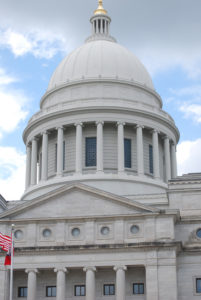 By Steve Brawner, © 2019 by Steve Brawner Communications, Inc.
By Steve Brawner, © 2019 by Steve Brawner Communications, Inc.
Government in the United States isn’t designed to be like Great Britain’s, but that’s how it often functions. In Arkansas, that’s just a reality. In Washington, D.C., it’s a problem.
Political parties structurally are part of the British system, and the executive and legislative branches are interconnected. There are two major parties, Conservatives (Republicans) and Labor (Democrats), and also minor parties that do win seats in Parliament. The party that wins control in parliamentary elections forms a government. It’s headed by a prime minister, Theresa May, who is an elected member of Parliament who represents the town of Maidenhead.
May along with her Cabinet are really who chart the country’s direction. Her primary worry regarding Parliament is maintaining her Conservative Party’s support. If she doesn’t, she’ll lose her job. This could happen if she can’t manage Brexit, the politically impossible divorce from the European Union.
In contrast, the U.S. Constitution created separate branches and doesn’t mention parties. Here, a legislature supposedly makes laws enforced by an executive and interpreted by a judiciary. Those checks and balances theoretically limit each co-equal branch’s power. Arkansas’ Constitution created the same system.
But that’s not really how it works. Political parties arose early in American history. (Forming tribes was part of human nature long before forming representative democracies was.) The checks and balances don’t function like they should because partisan considerations override constitutional duties.
Meanwhile, the realities of a fast-moving and complicated world favor the executive branch. A president or governor can act and react while a 535-member Congress or a 135-member state Legislature is still trying to get everybody to take their seat. One person can command far more attention than a diverse legislative body. President Trump is one of the world’s most famous people, while most members of Congress are known only to their constituents. In Arkansas, Governor Asa Hutchinson is the Capitol’s rock star and the one in command of state government’s many agencies. While he works full-time, legislators meet only periodically. Because they are part-timers, term limits inhibits their power more than his.
The result is that government in both Little Rock and Washington often functions kind of like it does in Britain, even though the Constitution says otherwise.
Yes, in Arkansas the Legislature “makes the laws.” But Hutchinson is often the instigator on the biggest agenda items, such as tax cuts and highways. He is the one who proposes a budget based on the advice of his Department of Finance and Administration’s number crunchers, and then legislators merely tweak it.
He’s sort of Arkansas’ prime minister, in other words, but he’s definitely not a dictator. He doesn’t get everything he wants, and he must adjust his policies to gain support. One hundred thirty-five legislators have their own ideas. Still, when a noteworthy bill is winding through the process, one of the first questions to ask is, what’s the governor’s stance?
Hutchinson enjoys extraordinary support in the Legislature, where three-fourths of the members are Republicans like he is. His predecessors, Govs. Mike Huckabee and Mike Beebe, dealt with Legislatures controlled by the other party.
But eventually he or a future governor will have a tougher time. His next legislative session will be his last, so he’s probably at the height of his powers. Republican legislators are still basking in the glow of their recent state takeover. As this increasingly becomes the new normal, they’ll become more cussedly independent, as Democrats were when they dominated.
This disconnect between the way government is structured and the way it’s actually practiced works well enough – in Little Rock.
In Washington, not so much. The Constitution says the divisions should be based on branch: Congress vs. the president vs. the courts. Instead, they’re increasingly based on party, including in the courts. The results are executive overreach, an ineffectual Congress, courts that make laws, and partisan gridlock.
I don’t know how to fix it. We’re not getting rid of parties, and we’re not rewriting the Constitution.
But it could be worse. We could be Britain, where government seems to work more or less like it’s designed, and it’s an even bigger mess than we are right now.